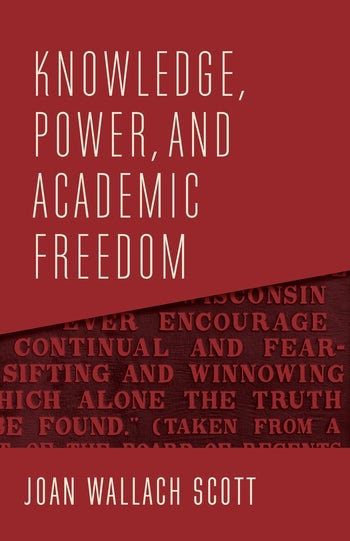Joan Wallach Scott
Professor Emerita
Institute for Advanced Study
School of Social Science
1 Einstein Drive
Princeton, NJ 08540
609-734-8280
Email: jws@ias.edu
Joan Scott received her PhD in History from the University of Wisconsin, Madison in 1969. She has taught at the University of Illinois, Chicago; Northwestern University; the University of North Carolina, Chapel Hill; and Brown University, where she was the founding director of the Pembroke Center for Teaching and Research on Women. In 1985, she became a professor in the School of Social Science at the Institute for Advanced Study; she held the Harold Linder Chair there from 2000 until her retirement in 2014. She is now Professor Emerita, continuing to attend seminars, give lectures, and write. She also has a continuing affiliation with the history department and the Committee on Globalization and Social Change at the Graduate Center of the City University of New York
Joan Scott's scholarship has challenged the foundations of conventional historical practice, including the nature of historical evidence and historical experience. Drawing on a range of philosophical thought, as well as on a rethinking of her own training as a labor historian, she has contributed to the formulation of a field of critical history. Written more than thirty years ago, her now classic article, "Gender: A Useful Category of Historical Analysis," continues to inspire innovative research on women and gender. In 2008, the American Historical Review (where it was published in 1986) reported that since 1997, it had been the most visited article on its JStor site.
Scott’s writing has long been concerned with the ways in which difference poses problems for democratic practice. She has taken up this question in Only Paradoxes to Offer: French Feminists and the Rights of Man (1996); Parité: Sexual Equality and the Crisis of French Universalism (2005); and The Politics of the Veil (2007). In Sex and Secularism (2017), she extended her work on the veil to examine the relationship between secularism and gender equality. She has published a collection of her essays dealing with the uses of psychoanalysis, particularly fantasy, for historical interpretation: The Fantasy of Feminist History (2011).
Scott continues an abiding interest in academic freedom, having served for many years on the American Association of University Professors Committee on Academic Freedom and Tenure. Her Knowledge, Power, and Academic Freedom (2019) is a collection of her influential essays on that topic. Most recently, Scott has turned to the question of history-writing itself, its uses and its politics. In On the Judgment of History (2020), she looks at the idea that “history” is itself a judge of human action, suggesting instead that that idea carries unexamined political implications. Her current work critically challenges the frequently intoned mantra of academic historians to “let the facts speak for themselves.” That notion, she argues, belies the ways in which historians necessarily interpret evidence according to their understandings of human intention and motivation, understandings that bring present thinking to representations of the past. Scott is a founding editor of History of the Present: a Journal of Critical History.
Scott has been recognized with honorary degrees from a number of academic institutions, including Brown, Harvard, Princeton, the University of Bergen (Norway) and the University of Liège (Belgium). In May, 2009, she received an honorary doctorate from the University of Wisconsin–where she had earned her PhD. And in 2023, she was awarded an honorary doctorate from the University of Paris 8 (Saint Denis-Vincennes).
Several of Scott’s books have won prizes from the American Historical Association, which also awarded her the Nancy Lyman Roelker prize for graduate mentoring in 1995. At its meeting in January, 2009, the AHA presented her with an award for Scholarly Distinction, the culmination of more than 40 years of research and writing in her chosen fields of French history, women’s and gender history, and feminist theory. For her work on gender, she received the Hans Sigrist Prize from the University of Bern (Switzerland) in 1999. In 2006, the Middle East Studies Association awarded her its Academic Freedom Prize. The American Academy of Arts and Sciences recognized her outstanding contributions to scholarship with the Talcott Parsons Prize in 2016. She became a Chevalier of the French Legion of Honor in 2017 and was awarded the Edgar Picciotto International Prize by the Graduate Institute of Geneva in 2018. In 2020, she became an honorary fellow of the American Society for Legal History.
